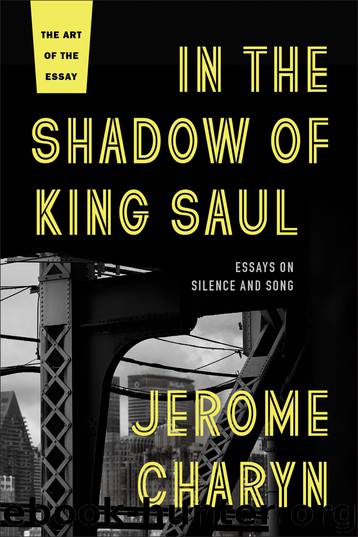In the Shadow of King Saul by Jerome Charyn

Author:Jerome Charyn
Language: eng
Format: epub
ISBN: 9781942658436
Publisher: Bellevue Literary Press
Published: 2018-07-18T16:00:00+00:00
5
BABEL MAY HAVE WALKED PARIS, but he was no flâneur, like Walter Benjamin or Baudelaire. Benjamin was a pathfinder who could feel the lyrical pull between epochs, fall upon arcades or wounded stones in Paris or Marseilles, discover the design of the nineteenth century embedded in the twentieth. His home was the library he carried from place to place, with the quotations he would cram into every text like some movable mosaic. Babel wasn’t of the same priesthood.
The two stories he wrote about Paris, “Dante Street” (1934) and “The Trial” (1938), read like bits of a travelogue, or the journal of someone stuck in a place he doesn’t want to be. “There is no solitude more deadly than solitude in Paris,” says the nameless narrator of “Dante Street,” who wears the trappings of Isaac Babel. “For all those who come from afar this town is a form of exile.” In “The Trial,” Ivan Nedachin, a former lieutenant colonel with the Whites, who has wandered from Zagreb to Paris, where he couldn’t pass the taxi driver test, becomes a gigolo and a jewel thief. The daughter-in-law of his last victim goes to the police. Nedachin is arrested in a Montparnasse wine cellar “where Moscow gypsies sang.” At criminal court a gendarme pushes him “out into the light, as a bear is pushed into a circus arena.” He is a bear, but from some unknown circus. “He towered over the crowd—helpless, large, with dangling arms—like an animal from another world.”
Babel was this same animal, and not because of Paris. Paris becomes a macabre stand-in for the feeling of foreignness in his own psyche. . . .
Babel’s best story about Paris takes place in Petersburg. Published in 1932 (like “Argamak”), it has ambiguous antecedents. Babel would have us believe that he composed “Guy de Maupassant” between 1920 and 1922. But I’d swear it couldn’t have been written, or greatly revised, until after his first trip to France. Cynthia Ozick calls the story “a cunning seriocomic sexual fable fixed on the weight and trajectory of language itself.” It’s also Babel’s most disturbing autobiography.
The narrator, whose fortunes are closely linked to Babel’s, finds himself in Petersburg in 1916 with a forged passport and without a penny. He’s twenty years old and he’s taken in by Alexey Kazantsev, a teacher of Russian literature whose real passion is Spain. “Kazantsev had never so much as passed through Spain, but his love for that country filled his whole being.”
Babel has visited upon Kazantsev his own puppy love for France. He appears like a ghostly fragment inside all the main characters—as if they (and we ourselves) were swimming with Isaac Babel in the underbelly of a dream. . . .
The narrator refuses to become a clerk: “[B]etter starve, go to jail, or become a bum than spend ten hours a day behind a desk in an office.” And this credo feeds Babel’s own mythology, testifies to his acumen as the barefoot boy who rushes from one adventure to the next.
Download
This site does not store any files on its server. We only index and link to content provided by other sites. Please contact the content providers to delete copyright contents if any and email us, we'll remove relevant links or contents immediately.
| African | Asian |
| Australian & Oceanian | Canadian |
| Caribbean & Latin American | European |
| Jewish | Middle Eastern |
| Russian | United States |
4 3 2 1: A Novel by Paul Auster(11052)
The handmaid's tale by Margaret Atwood(6856)
Giovanni's Room by James Baldwin(5879)
Big Magic: Creative Living Beyond Fear by Elizabeth Gilbert(4723)
Asking the Right Questions: A Guide to Critical Thinking by M. Neil Browne & Stuart M. Keeley(4576)
On Writing A Memoir of the Craft by Stephen King(4215)
Ego Is the Enemy by Ryan Holiday(3991)
Ken Follett - World without end by Ken Follett(3973)
The Body: A Guide for Occupants by Bill Bryson(3802)
Bluets by Maggie Nelson(3711)
Adulting by Kelly Williams Brown(3671)
Guilty Pleasures by Laurell K Hamilton(3587)
Eat That Frog! by Brian Tracy(3514)
White Noise - A Novel by Don DeLillo(3436)
The Poetry of Pablo Neruda by Pablo Neruda(3367)
Alive: The Story of the Andes Survivors by Piers Paul Read(3312)
The Bookshop by Penelope Fitzgerald(3229)
The Book of Joy by Dalai Lama(3218)
Fingerprints of the Gods by Graham Hancock(3214)
